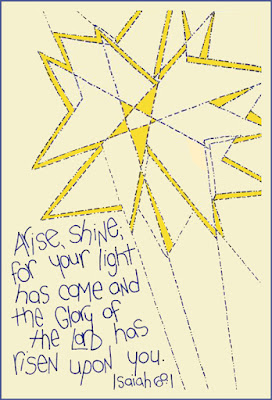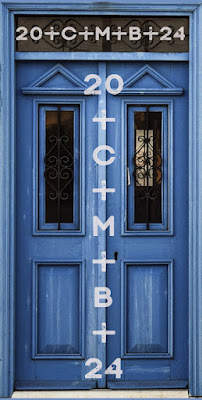and the glory of the Lord
has risen upon you.
Isaiah 60:1
Matthew 2:1-12
1 In the time of King Herod, after Jesus was born in Bethlehem of Judea, wise men from the East came to Jerusalem, 2 asking, "Where is the child who has been born king of the Jews? we observed his star at its rising, and have come to pay him homage."
3 When King Herod heard this, he was frightened, and all Jerusalem with him; 4 and calling together all the chief priests and scribes of the people, he inquired of them where the Messiah was to be born. 5 They told him, "In Bethlehem of Judea; for so it has been written by the prophet:
6 'And you, Bethlehem, in the land of Judah, are by no means least among the rulers of Judah; for from you shall come a ruler who is to shepherd my people Israel.'"7 Then Herod secretly called for the wise men and learned from them the exact time when the star had appeared. 8 Then he sent them to Bethlehem, saying, "Go and search diligently for the child; and when you have found him, bring me word so that I may also go and pay him homage."
9 When they had heard the king, they set out; and there, ahead of them, went the star that they had seen at its rising until it stopped over the place where the child was.
10 When they saw that the star had stopped, they were overwhelmed with joy. 11 On entering the house, they saw the child with Mary his mother; and they knelt down and paid him homage.
Then, opening their treasure chests, they offered him gifts of gold, frankincense, and myrrh. 12 And having been warned in a dream not to return to Herod, they left for their own country by another road.
Epiphany Day + Season
Combining the roots epi = "upon" and phan = "manifestation, revelation, illumination, uncovering," an epiphany is a shining out, showing forth.
Days after Christmas offer several possibilities. When January 6th doesn't fall on a Sunday, many churches celebrate Epiphany on the nearest Sunday. Last Sunday I wrote about Jesus' Presentation in the Temple; the Circumcision and Name of Jesus on January 1st would have worked well for this first Sunday of this new year. January 6th was Christ's birthday until the 4th century, when Emperor Constantine moved it to a few days after the solstice to correlate with the Feast of the Unvanquished Sun people already knew about. After that, January 6th became the baptism of Jesus, as it still is in Eastern expressions of Christianity. Some Western churches that follow the lectionary are observing Jesus' baptism today, January 7th.
The day of Epiphany initiates the variable length (because the date of Easter varies) season of Epiphany that extends until Ash Wednesday. Or Shrove Tuesday. Western protestant churches celebrate Transfiguration on the Sunday before Ash Wednesday, making the theophanies of Jesus' baptism and his transfiguration bookends. The entire season focuses on the light of Christ and his light reflected in us. In the global North, Epiphany arrives shortly after the winter solstice, making its symbolism of light especially full of meaning. Stars are the epiphany symbol.
From the East
Because Matthew is the only gospel with the visiting magi, the gospel reading for the day of Epiphany always comes from Matthew. We sing "We Three Kings of Orient Are," but scripture doesn't say the gift-bearing visitors were kings, and it doesn't say how many there were. In fact, the only kings in this story are the Roman puppet King Herod and King Jesus. However, the text mentions three gifts that symbolize Jesus' identity and ministry, which is the reason the Western Church says three (although the Eastern Church says twelve).
These three from the east along with their retinues probably were Zoroastrian priests, probably from Persia; they also were astrologers who studied and interpreted stars for signs and meanings. They may have been astronomers in our sense of people with expertise about the heavenly bodies. In any case, they belonged to a different culture, religion, and ethnicity than the Jews (Israelites, Hebrews), who were God's chosen, distinctive people. They were outsiders. They were not people of the covenant, bearers of God's promises. But a star led them to the Jewish baby Jesus who is savior of all, Lord of all, king and ruler for all cultures, social statuses, abilities, ethnicities, and religions.
Today's narrative closely relates to Matthew's genealogy with its many non-Jews and ethnic "others." Jesus' final charge to us in Matthew 28:18-20 tells us to make disciples of all nations—all people everywhere! By water and the word, make them insiders to God's covenants, sharers of God's promises.
Discernment + Direction
These persons who almost definitely were guys based their decision to set out for Bethlehem and later leave for home by a different route on:
• studying signs in the skies;
• reading their scriptures or holy book, or maybe the Hebrew scriptures, especially Micah 5:2 and its reference to Bethlehem;
• trusting and heeding messages they received in a dream.
God does whatever it takes to reach out to and embrace everyone: a star for people who knew the skies and who trusted sky signs; a scripture passage for people who were biblically literate and trusted those texts; dreams for those who relied on less conscious, rational, information. Skies and scriptures and dreams all point to the savior of all persons. The reconciler of all creation.
Light + Evangelism
God said, "Let there be light" and light became the first element of creation. Today's passages in Isaiah and Matthew both celebrate light.
Isaiah 60 announces our light is here! In 2:9 Matthew writes about a star at "the rising" of the sun, at daybreak, at dawning. Stars are scattered all over the Matthew reading with east, east, star, star (and magi in the room, not back in the stable). "From the east" is anatolia—the rising of the sun, and not Bruce Springsteen's 911 tribute song, The Rising. Latin words oriens and orient mean the same as Greek anatolia—the other side of the world from ours? Global East rather than *our* global West?
The season of Epiphany emphasizes evangelism—letting Jesus' light shine through us as individuals, and through the church as a whole. Knowing about revealing Jesus with a star, a scripture, and a dream, helps enlighten our imaginations.
This account of strangers from the East, from The Rising – where the sun opens wide a new day – opens up questions of inclusion, boundaries, people who are like us, people who are different from us. It begs binaries of us/them, insiders/outsiders, natives/immigrants. Even earlier than the three-part book of Isaiah, scripture reveals (provides an epiphany) of the God who fills heaven and earth as God for all, God with all.
God has created us to be and to act in the divine image, yet we still need bounded, contained places and relationships. We really cannot leave all doors unlocked for everyone to enter. As families, as individuals, as a church, it often can be difficult to know who to let in or keep out.
Star Words + Chalk House Blessings
Stars are the epiphany symbol! As an alternate or in addition to New Year's resolutions, there's a recent tradition of choosing a star word early in the new year as a guide for the upcoming year. You can ask someone else to suggest one, or in the Spirit claim a word. I missed the past couple of years, but this year I found my word Flourish on an internet list of about fifty suggestions.
Blessing your dwelling (house, apartment, office, workshop, studio, retail space, etc.) with chalk is an historical practice for New Year's Day, Epiphany, or any time. An internet search will provide resources to make the blessing short and simple or long and elaborate. The inscription for this year is 20+C+M+B+24—the calendar year with CMB sandwiched in the middle.
CMB can stand for traditional magi names Caspar, Melchior, and Balthasar, or it can be initials for Christus Mansionem Benedicat / May Christ Bless this House. Although Latin "house" is similar to English mansion for a huge dwelling (or manse for the pastor's house that's not usually very big), it doesn't imply large. It's a home, a way station, a stayover place. You can bless the main entrance and/or separate rooms.


No comments:
Post a Comment